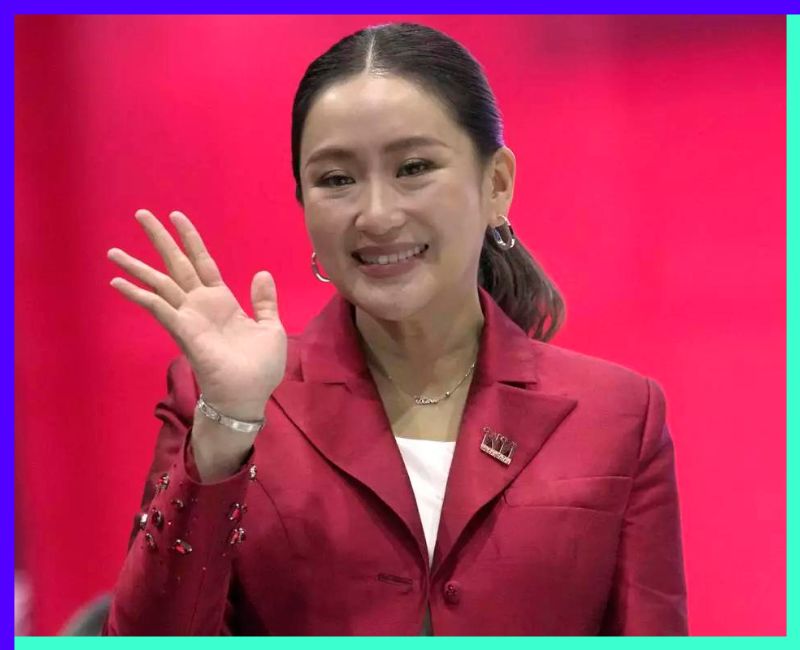Paetongtarn Shinawatra, the 37-year-old daughter of the influential former prime minister Thaksin Shinawatra, has been officially appointed as Thailand’s next prime minister, making her the youngest leader in the country’s history. Her ascent to power follows a tumultuous week in Thai politics, marked by the sudden ousting of her predecessor, Srettha Thavisin, through a court ruling.
The unexpected appointment of Paetongtarn came after intense negotiations that spanned 24 hours. These discussions were triggered by the Constitutional Court’s decision that removed Srettha from office. Despite her lack of prior government experience, Paetongtarn’s deep-rooted political lineage and the legacy of her father have played a significant role in securing her position.
Thaksin Shinawatra, a billionaire and a former prime minister who was deposed in a coup in 2006, remains a polarizing figure in Thai politics, yet his influence is undeniable.
Paetongtarn is now the fourth member of the Shinawatra family to assume the prime ministerial role. Before her, Thaksin’s sister, Yingluck Shinawatra, served as Thailand’s prime minister from 2011 to 2014, until she was removed by a court decision.
Additionally, Thaksin’s brother-in-law, Somchai Wongsawat, briefly held the office in 2008 before also being ousted by judicial means. Paetongtarn follows in the footsteps of her aunt Yingluck as the second woman to lead Thailand.
The parliamentary vote on Friday saw Paetongtarn secure the necessary majority to be confirmed as prime minister, needing at least 247 votes from the 493 members present. This victory is particularly significant as it comes at a time of heightened political instability in Thailand.
Paetongtarn’s appointment is the latest chapter in the Shinawatra family’s ongoing saga in Thai politics, which has been characterized by repeated conflicts with the country’s military and royalist elites. Thaksin Shinawatra, who returned to Thailand last year after spending 15 years in self-imposed exile, had made a surprising pact with his former adversaries in the royalist military establishment.
This controversial agreement was seen by many as a betrayal, especially by voters who had supported the Shinawatras due to their populist policies.
The political landscape in Thailand has been further complicated by the emergence of the Move Forward party, which garnered significant support in the last election with its promises of democratic reforms and breaking up large monopolies. The party’s success posed a serious challenge to the established political order, leading to a series of legal maneuvers aimed at undermining its influence.
The recent court ruling that disqualified Srettha Thavisin from the prime ministership has highlighted the precarious nature of the current political arrangement. Srettha, a real estate mogul, had been in office for less than a year before his removal, becoming the fourth Thai prime minister in the past 16 years to be ousted by a Constitutional Court ruling. His dismissal was based on the appointment of a minister who had previously served a jail sentence, a decision widely viewed as politically motivated.
Adding to the turmoil, the court had just a week earlier disbanded the Move Forward party over its campaign pledge to reform Thailand’s strict lese majesty laws. This move effectively disenfranchised more than 14 million voters who had supported the party, prompting accusations of a “judicial coup” from political analysts and observers.
Despite these challenges, Paetongtarn has expressed confidence in her ability to lead the country through its current economic difficulties. In her first statements as the Pheu Thai party’s prime ministerial candidate, she acknowledged the unfortunate circumstances surrounding Srettha’s removal but emphasized the need for the country to move forward.
“I have confidence in Pheu Thai. I believe in the coalition government and our ability to steer Thailand out of the economic crisis,” Paetongtarn stated.
Her involvement in the Pheu Thai party’s election campaign was notable, especially as she continued to engage with voters even during her pregnancy. Although the party ultimately came in second in the election, Paetongtarn’s efforts helped maintain the party’s stronghold among older, rural voters in the northern and northeastern regions of Thailand.
Her decision not to run for prime minister last year was seen as a strategic move, allowing her to preserve her political capital for future opportunities.
Political experts, such as Ken Lohatepanont, suggest that the coalition formed between Pheu Thai and its erstwhile opponents in the royalist military is likely to endure, primarily because both sides share a common goal of keeping the Move Forward party and its successor, the People’s Party, out of power. However, Lohatepanont also notes that Thaksin Shinawatra’s influence is being increasingly constrained by the political dynamics in Thailand, which has forced him into the difficult position of supporting his daughter’s candidacy for prime minister.
The Shinawatra family’s decision to put Paetongtarn in the prime ministerial seat reflects both their enduring influence in Thai politics and the considerable risks they face. The frequent legal actions against politicians, particularly those associated with the Shinawatra family, underscore the volatile and often hostile environment in which they operate.
Paetongtarn now faces the daunting task of leading a deeply divided nation through uncertain times. Her success will depend not only on her ability to navigate the complex political landscape but also on her capacity to address the pressing economic and social challenges facing Thailand. As the youngest prime minister in the country’s history, Paetongtarn’s leadership will undoubtedly shape the future of Thai politics for years to come.
resource – https://www.theguardian.com/world/article/2024/aug/16/paetongtarn-shinawatra-thailand-pm-replacement-voting-thaksin-shinawatra
